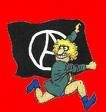Budapest's Keleti station is the kind of station that train-spotters love and other stations aspire to. It is huge in the way that all good termini used to be before they got all modern and clever.
At one end is a giant window that would grace a cathedral. Down each side a jumble of stalls and shops sell kebabs, here called gyros, unbelievably creamy-looking ice-creams, tickets, newspapers, cigarettes, beer and all the necessities and paraphernalia of travel.
People hurry to and from platforms, look at the information boards and head for the Metro, the exits and the information kiosk, tucked away in one corner. In the melee a group of people play chess, an impromptu band plays and the occasional panicking traveller tries to work out where his train is. Taxi drivers pounce and people with rooms to let ply their trade.
A white haired granny tried to push a room for 7000 Hungarian Forints (HuF) – twice the going rate.
“Good luck, I’ve got no money.” I said. I went into the information parlour. Three or four sallow youths fielded the various woes and queries of groups of travellers, all foreign.
When I emerged, all the more knowledgeable, I made for the ATM and used my foolproof system for getting the perfect amount of cash out – I requested the second highest amount on offer. Regardless of exchange rates and costs of living, this usually does me for 2-4 days.
Outside the station a tangle of roads, tram-lines, zebra crossings and traffic islands played host to weeds, rubbish and a mess of traffic. Amongst the detritus of civilisation, the dust, the withered grass and the legs of pedestrians, down and outs slept in Hungary’s hottest weather on record.
All this played out in an area that could have housed a 50,000 seat stadium. Around the edges huge fin de siècle buildings boasted of past glory. At their height they would have looked upon the gentry riding past in their horse-drawn carriages , long before Europe dissolved into WWI. Now the glory was faded, but the spirit was unbroken even if the concrete often was.
The skyline, high above, was of huge roofs, leaded sheeted and tiled, with the odd onion dome frivolity. Two or three rows of windows in the roofs alone, hinted at the size within. Three metre windows lit high-ceilinged parlours and bedrooms. Closer to street level the unwanted was kept out by intricate wrought-ironwork. Great solid oak doors, battered from the decades, hid behind ornate gates. Occasional alleys allowed a glimpse into the courtyards secreted within.
At Astoria, where I had to get out of the bus, the massive scale continued. The buildings climbed skywards along wide avenues. At the crossroads formed by two giant boulevards a Metro station sucked people underground. Eight exits, one for each side of each of the four streets, confused me so I recourse to my other brilliant tactic, that of following the prettiest girl going in roughly the right direction. It didn’t work – it rarely does – but I got my bearings and re-emerged, meerkat-like, metres from a narrow side lane.
Concrete frontages blackened over the ages mixed with the sooty plane trees to darken the street several notches. Walking through a short tunnel I emerged into a courtyard. Balconies rose four or five storeys high, the sort that should have washing lines stretched from one side to the other. At the bottom, talking quietly on a pile of rubble, three workmen took a break.
Upstairs I looked out of the window as a helpful guy phoned around to find a place that did have room. In a doorway across the street I spotted some high-class graffiti – ‘Kiri te Kanawa’ – sprayed in foot high letters.
Following his instructions less than carefully I immediately got lost. Even following pretty girls held limited interest for me in the stifling heat. Eventually I found the bus stop opposite a heavily tiled synagogue and rode the bus the prescribed three stops. Opposite a twin-spired Catholic church a friendly troll was trying to lure two backpackers through the gates into a desiccated garden. Behind, a five metre door stood ajar.
Giving up on the others, he beckoned me in. They had a room, though I was lucky: the Formula One Grand Prix was in town and rooms were scarce and prices were climbing.
Like many Hungarians he spoke only German as a second language.
“Ah, New Zealand!” he said when he saw my registration.
“Sehr gut. Australia nicht so gut.”
Disfigured by an unfortunate collection of facial warts big and small, including one which formed a permanent drip under his nose, he pointed at some containers of food.
“Kina” he said, using the Hungarian for ‘Chinese’.
“Ist gut?”
I was still a little confused by what I thought was a sudden splash of Maori in the conversation, but recovered enough to get directions. As a side trip I went to a small corner shop: I had to try a Hungarian beer. They were all cheaper than Coke.
In mime I was told that the one I had chosen was okay, but improved markedly the more I drank Five was the recommended number. I bought one and headed to the takeaway.
Eight dollars bought more than I could eat. Back in the hostel, the troll saw my supper and with a great flourish, bowed and wished me “Gut appétit.”
Afterwards I checked my emails, showered and slept properly for the first time in four days.

No comments:
Post a Comment